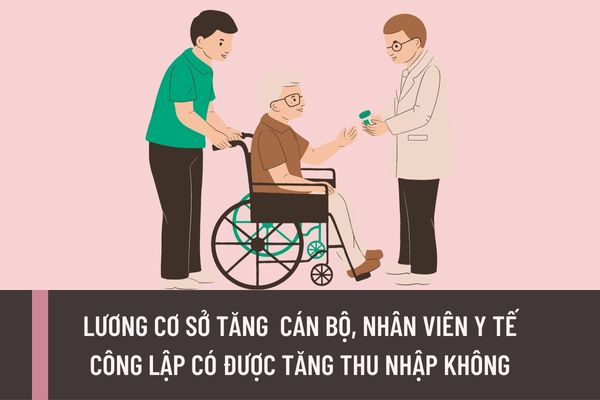Statutory pay rate will be increased from July 1, 2023, can public healthcare workers be entitled to increase their income? What are the current preferential allowances of public healthcare workers in Vietnam?
- Statutory pay rate will be increased from July 1, 2023, can public healthcare workers be entitled to increase their income?
- What are the regulations on the new preferential allowances for healthcare workers at public health facilities in Vietnam?
- What are the criteria for professional ethics for healthcare workers in Vietnam?
Statutory pay rate will be increased from July 1, 2023, can public healthcare workers be entitled to increase their income?
Pursuant to Article 3 of Decree 38/2019/ND-CP stipulating as follows:
Statutory pay rate in Vietnam
1. The statutory pay rate in Vietnam is the basis for:
a) Determining the levels of salaries in payrolls, allowances and other benefits as per the law with regard to individuals as defined in Article 2 hereof;
b) Determining subsistence allowances as per the law;
c) Determining contributions and benefits concerning the statutory pay rate.
2. From July 1, 2019, the statutory pay rate is VND 1,490,000 per month.
3. The Government shall request the National Assembly to consider adjusting statutory pay rate in conformity with the capacity of the state budget, consumer price index and national economic growth rate.
Thus, currently the statutory pay rate applied until June 31, 2023 is VND 1.49 million.
However, based on Clause 1, Article 3 of Resolution 69/2022/QH15, the National Assembly stipulates that the statutory pay rate will be increased to VND 1.8 million/month from July 1, 2023.
Because the statutory pay rate is used as the basis for calculating the salary level in the salary tables, allowances and implementation of other regimes as prescribed by law for cadres, civil servants, public employees and employees enjoying salaries from the state budget.
At that time, when the statutory pay rate is increased, the incomes, including salaries and allowances of healthcare workers at public health facilities, will also increase according to the statutory pay rate from July 1, 2023.

Statutory pay rate will be increased from July 1, 2023, can public healthcare workers be entitled to increase their income? What are the current preferential allowances of public healthcare workers in Vietnam?
What are the regulations on the new preferential allowances for healthcare workers at public health facilities in Vietnam?
Pursuant to Article 3 of Decree 56/2011/ND-CP (supplemented by Article 1 of Decree 05/2023/ND-CP) on the new preferential allowances for healthcare workers at public health facilities in Vietnam as follows:
- The allowance of 70% applies to civil servants who regularly and directly perform the following jobs:
+ Testing, examining, treating and caring for patients with HIV/AIDS, leprosy, tuberculosis, and mental illness;
+ Forensic examination, forensic psychiatry, pathology.
- The allowance of 60% applies to civil servants who regularly and directly perform the following jobs:
+ Examining, treating and taking care of patients in emergency, emergency resuscitation, emergency 115, infectious disease;
+ Testing and prevention of infectious diseases;
+ Border medical quarantine.
- The allowance of 50% applies to civil servants and public employees who regularly examine, treat, care for and serve patients with anesthesia, resuscitation, intensive care, pediatrics, anti-poison, burns and dermatology.
- The allowance of 40% applies to regular civil servants and employees who directly work in preventive medicine; test; medical examination and treatment; infection control, patient care, functional rehabilitation; medical assessment; traditional medicine; cosmeceuticals; food safety and hygiene, medical equipment; reproductive health at public health service establishments and at nursing facilities for war invalids, sick soldiers and people with special disabilities, except for the cases specified in (1), (2), (3). ).
- The allowance of 30% applies to the following civil servants and public employees:
+ Civil servants and public employees who regularly and directly work as medical professionals to perform the following tasks: health communication and education; population - family planning;
+ Public servants and public employees who manage and serve not directly as medical professionals at establishments, institutes, specialized hospitals, centers: HIV/AIDS, leprosy, tuberculosis, psychiatric, pathological surgery , forensics.
- The allowance of 100% (applied from January 1, 2022 to the end of December 31, 2023):
+ Applies to regular officers who directly work as preventive medicine specialists (including border medical quarantine); do medical professionals at health stations of communes, wards and townships, regional polyclinics, maternity wards, medical centers of districts, urban districts, towns, provincial cities, and cities under a city directly under the central government and hospitals at the district, district, township, provincial city and city level under the central government.
- For civil servants and public employees who do not directly work as medical professionals; public servants and health workers in charge of management and service at medical non-business units in general (except for the subjects specified at Point b, Clause 5, Article 3 of Decree 56/2011/ND-CP), healthcare workers If a person is a professional health worker at an agency, unit or school, the head of the unit shall consider and decide based on the characteristics of the job and the revenue source, but not exceeding 20% of the rate . Current salary and rank plus allowances for leadership positions and allowances for seniority beyond the bracket (if any) of the beneficiaries.
What are the criteria for professional ethics for healthcare workers in Vietnam?
Pursuant to Article 3 of Joint Circular 10/2015/TTLT-BYT-BNV stipulating criteria for professional ethics for healthcare workers as follows:
- Being dedicated to serving the career of care, protection and improvement of people’s health.
- Understanding and complying well with the code of conduct of officials of health sector.
- Practicing profession in accordance with regulation and procedures for technical profession and other regulations of law.
- Constantly studying to improve level and professional qualification.
- Respecting patient’s right.
- Being honest, objective, fair, responsible, solidarity, respectful, and collaborative with colleagues in professional practice.
LawNet
